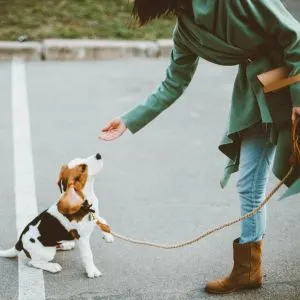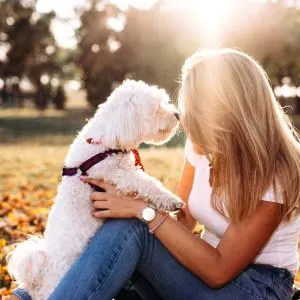Most people who get a puppy want their puppy to love them as much as they love their puppy. After all, for many, the whole point of getting a puppy is to have a faithful companion that will offer unconditional love.
Dogs and humans have shared a special bond for thousands of years, evolving from the days when early humans and wolves first discovered that working together was mutually beneficial. Humans provided food and in return the wolves provided protection from other wild predators.
To a certain extent this is still the basis of our relationship with dogs today, but protection has evolved to include companionship and affection.
But, this bond doesn’t happen overnight. You need to work on creating a solid foundation that’s built on mutual trust and understanding.
In this post, we will provide practical and effective ways to make sure that your puppy feels loved and returns that feeling. We’ll look at everything from daily care essentials to understanding your puppy’s psychological needs.
Let’s get started on making sure your puppy knows they’ve found their forever best friend.

Understanding Your Puppy’s Needs
The first step in bonding with your puppy is understanding both their physical and emotional needs. This dual approach not only ensures their well-being but also lays the groundwork for a deep, loving relationship between you and your new furry friend.
Physical Needs
Caring for your puppy’s physical needs is essential. This includes providing balanced nutrition, clean water, a safe living environment, and regular visits to the vet for vaccinations and health check-ups.
When you provide these things to your puppy consistently you are building a relationship based on trust and understanding. As your puppy grows and learns that you are a consistent provider of what they need, their trust in you will deepen, paving the way for a loving and loyal companionship.
Emotional Needs
Addressing your puppy’s emotional needs is just as crucial as taking care of their physical requirements. Puppies crave companionship, love, and security, thriving on positive interactions with their human families.
A study published in the journal “Science,” highlights this, showing that when dogs and their owners share prolonged eye contact, both experience an increase in oxytocin levels.
Oxytocin, often referred to as the “love hormone,” plays a crucial role in bonding and affection in humans. This biological response underscores the emotional depth of the relationship between dogs and humans, suggesting that these connections are not only behavioral but also fundamentally rooted in our biology.
Steps to Take to Bond With Your Dog
1. Hand Feeding
Start the bonding process by hand feeding your puppy. Hand feeding is a powerful method to foster a strong bond between you and your new pup. This approach not only aids in building trust but also in teaching your puppy that positive experiences come from interactions with you.

2. Stay Close at Night
The first few nights in a new home can be frightening for a puppy, who is used to the warmth and security of its litter-mates. While it’s crucial to keep your puppy safe when you’re unable to supervise them, consider finding ways to stay close during these initial nights to ease their anxiety and help them adjust.
This initial closeness will foster trust and strengthen the emotional connection between you and your puppy.
3. Spend Quality Time Together
Building a bond with your puppy through daily interaction is key. Play, cuddling, and shared activities not only strengthen your relationship but also contribute to your puppy’s social and emotional development.
Shared activities include:
- Learning new tricks together
- Working on obedience training
- Going for walks
- Playing fetch or hide-and-seek
The act of playing with your puppy has been scientifically shown to have long-term benefits for their mental health. A study highlighted by Psychology Today found that dogs who frequently engaged in playful interactions with their owners had lower levels of cortisol, a stress hormone, in their fur.
This suggests that play acts as a powerful stress buffer for dogs, reducing their anxiety and making them feel more secure and attached to their owners.

4. Positive Reinforcement Training
Positive reinforcement training, utilizing treats and praise as you teach your puppy new things, is an effective way to bond with your puppy while encouraging good behavior. This method builds trust as it teaches the puppy that following commands or exhibiting desired behaviors leads to positive outcomes.
5. Consistent Routine
Consistency provides a sense of security and predictability, which is comforting to dogs. When puppies know what to expect in their daily lives—such as regular times for meals, walks, play, and sleep—they feel safer and more relaxed.
This stability helps reduce anxiety and stress, making it easier for your puppy to focus on bonding with you. A routine also establishes you as the leader, reinforcing trust and love as your puppy learns to rely on you for their needs.
6. Learn to Communicate
While dogs naturally pick up on our emotions, they still need to learn verbal and non-verbal cues from us. This allows them to understand and respond to our commands effectively.
We also need to learn how to interpret their body language and vocalizations so that we understand their needs and emotions. For instance if:
- they are wagging their tail and have a relaxed stance this usually signify happiness,
- their ears are pinned back with a lowered body and tail between their legs this can mean fear,
- they paw at you, they’re likely seeking attention
- their head is tilted this may indicate they’re puzzled
- they suddenly sniff around it can be a sign they need to potty
By recognizing and responding to these signs, you build a deeper trust and connection.

7. Grooming
Regular grooming sessions can significantly enhance the bond between you and your puppy. These activities not only keep your puppy healthy and comfortable but also provide a peaceful time for both of you to connect on a deeper level.
Gentle handling during these sessions builds trust and reassures your puppy of your care and affection.
8. Socialization
Socializing your puppy is another important step in building a strong bond and earning their love. It involves gently introducing them to new experiences, people, and other animals. This helps your puppy become more confident and comfortable in various situations knowing you are there to watch over them.
A well-socialized puppy is likely to be more relaxed, friendly, and trusting towards you and others. This trust and comfort with you, cultivated through positive social experiences, naturally deepen your bond and enhance the love your puppy has for you.
9. Patience
Patience plays a vital role in developing trust with your puppy, as it demonstrates understanding of their learning curve, and reduces their stress. However, losing your patience can lead to fear and mistrust, damaging the bond between you and your puppy.

In conclusion,
Building a caring relationship with your puppy is rooted in consistency, patience, and understanding. These elements are key to nurturing a loving bond that enhances both your and your puppy’s well-being. Through consistent routines, patient training, and an effort to understand their needs and communications, you lay the foundation for a deep, enduring connection.
